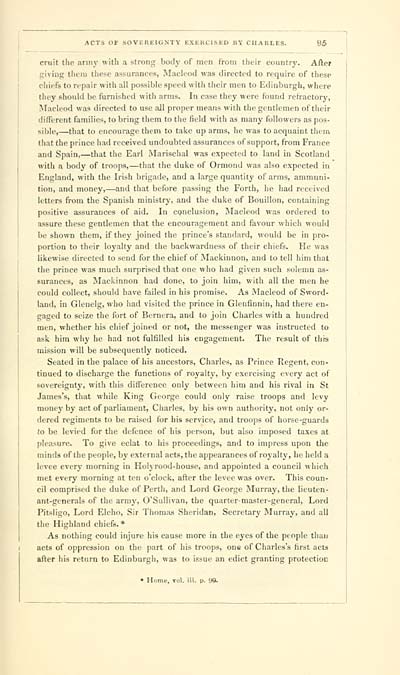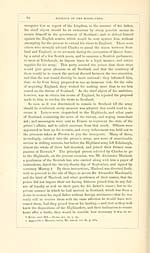Download files
Complete book:
Individual page:
Thumbnail gallery: Grid view | List view

ACTS OF SOVEREIGNTY EXERCISED B\ CHARLES. 96
cruit the army with a strong body of mon frotii their country. After
i;iving thoiii these assurances, Macleod was directed to require of these
rliiefs to repair with all possible speed with their men to Edinburgh, where
they should be furnished with arms. In case they were found refractory,
Macleod was directed to use all proper means with the gentlemen of their
different families, to bring them to the field with as many followers as pos-
sible, — that to encourage them to take up arms, he was to acquaint them
that the prince had received undoubted assurances of support, from France
and Spain, — that the Earl Marischal was expected to land in Scotland
with a body of troops, — that the duke of Ormond was also expected in
England, with the Irish brigade, and a large quantity of arms, ammuni-
tion, and money, — and that before passing the Forth, he had received
letters from the Spanish ministry, and the duke of Bouillon, containing
positive assurances of aid. In conclusion, Macleod was ordered to
assure these gentlemen that the encouragement and favour which would
be shown them, if they joined the prince's standard, would be in pro-
portion to their loyalty and the backwardness of their chiefs. He was
likewise directed to send for the chief of Mackinnon, and to tell him that
tlie prince was much surprised that one who had given such solemn as-
surances, as Mackinnon had done, to join him, with all the men he
could collect, should have failed in his promise. As Macleod of Sword-
land, in Glenelg, who had visited the prince in Glenfinnin, had there en-
gaged to seize the fort of Bernera, and to join Charles with a hundred
men, whether his chief joined or not, the messenger was instructed to
ask him why he had not fulfilled his engagement. The result of this
mission will be subsequently noticed.
Seated in the palace of his ancestors, Charles, as Prince Regent, con-
tinued to discharge the functions of royalty, by exercising every act of
sovereignty, with this difference only between him and his rival in St
James's, that while King George could only raise troops and levy
money by act of parliament, Charles, by his own authority, not only or-
dered regiments to be raised for his service, and troops of horse-guards
to be levied for the defence of his person, but also imposed taxes at
pleasure. To give eclat to his proceedings, and to impress upon the
minds of the people, by external acts, the appearances of royalty, he held a
levee every morning in Holyrood-house, and appointed a council which
met every morning at ten o'clock, after the levee was over. This coun-
cil comprised the duke of Perth, and Lord George Murray, the lieuten-
ant-generals of the army, O'Sullivan, the quarter- master-general. Lord
Pitsligo, Lord Elcho, Sir Thomiis Sheridan, Secretary Murray, and all
the Highland chiefs.*
As nothing could injure his cause more in the eyes of the people tliau
acts of oppression on the part of his troops, one of Charles's first acts
after his return to Edinburgh, was to issue an edict granting protection
cruit the army with a strong body of mon frotii their country. After
i;iving thoiii these assurances, Macleod was directed to require of these
rliiefs to repair with all possible speed with their men to Edinburgh, where
they should be furnished with arms. In case they were found refractory,
Macleod was directed to use all proper means with the gentlemen of their
different families, to bring them to the field with as many followers as pos-
sible, — that to encourage them to take up arms, he was to acquaint them
that the prince had received undoubted assurances of support, from France
and Spain, — that the Earl Marischal was expected to land in Scotland
with a body of troops, — that the duke of Ormond was also expected in
England, with the Irish brigade, and a large quantity of arms, ammuni-
tion, and money, — and that before passing the Forth, he had received
letters from the Spanish ministry, and the duke of Bouillon, containing
positive assurances of aid. In conclusion, Macleod was ordered to
assure these gentlemen that the encouragement and favour which would
be shown them, if they joined the prince's standard, would be in pro-
portion to their loyalty and the backwardness of their chiefs. He was
likewise directed to send for the chief of Mackinnon, and to tell him that
tlie prince was much surprised that one who had given such solemn as-
surances, as Mackinnon had done, to join him, with all the men he
could collect, should have failed in his promise. As Macleod of Sword-
land, in Glenelg, who had visited the prince in Glenfinnin, had there en-
gaged to seize the fort of Bernera, and to join Charles with a hundred
men, whether his chief joined or not, the messenger was instructed to
ask him why he had not fulfilled his engagement. The result of this
mission will be subsequently noticed.
Seated in the palace of his ancestors, Charles, as Prince Regent, con-
tinued to discharge the functions of royalty, by exercising every act of
sovereignty, with this difference only between him and his rival in St
James's, that while King George could only raise troops and levy
money by act of parliament, Charles, by his own authority, not only or-
dered regiments to be raised for his service, and troops of horse-guards
to be levied for the defence of his person, but also imposed taxes at
pleasure. To give eclat to his proceedings, and to impress upon the
minds of the people, by external acts, the appearances of royalty, he held a
levee every morning in Holyrood-house, and appointed a council which
met every morning at ten o'clock, after the levee was over. This coun-
cil comprised the duke of Perth, and Lord George Murray, the lieuten-
ant-generals of the army, O'Sullivan, the quarter- master-general. Lord
Pitsligo, Lord Elcho, Sir Thomiis Sheridan, Secretary Murray, and all
the Highland chiefs.*
As nothing could injure his cause more in the eyes of the people tliau
acts of oppression on the part of his troops, one of Charles's first acts
after his return to Edinburgh, was to issue an edict granting protection
Set display mode to: Large image | Transcription
Images and transcriptions on this page, including medium image downloads, may be used under the Creative Commons Attribution 4.0 International Licence unless otherwise stated. ![]()
| Early Gaelic Book Collections > Ossian Collection > History of the Highlands and of the Highland clans > Volume 3 > (121) |
|---|
| Permanent URL | https://digital.nls.uk/79653874 |
|---|
| Description | Vol. III. |
|---|---|
| Shelfmark | Oss.249 |
| Attribution and copyright: |
|
| Description | Selected books from the Ossian Collection of 327 volumes, originally assembled by J. Norman Methven of Perth. Different editions and translations of James MacPherson's epic poem 'Ossian', some with a map of the 'Kingdom of Connor'. Also secondary material relating to Ossianic poetry and the Ossian controversy. |
|---|
| Description | Selected items from five 'Special and Named Printed Collections'. Includes books in Gaelic and other Celtic languages, works about the Gaels, their languages, literature, culture and history. |
|---|

